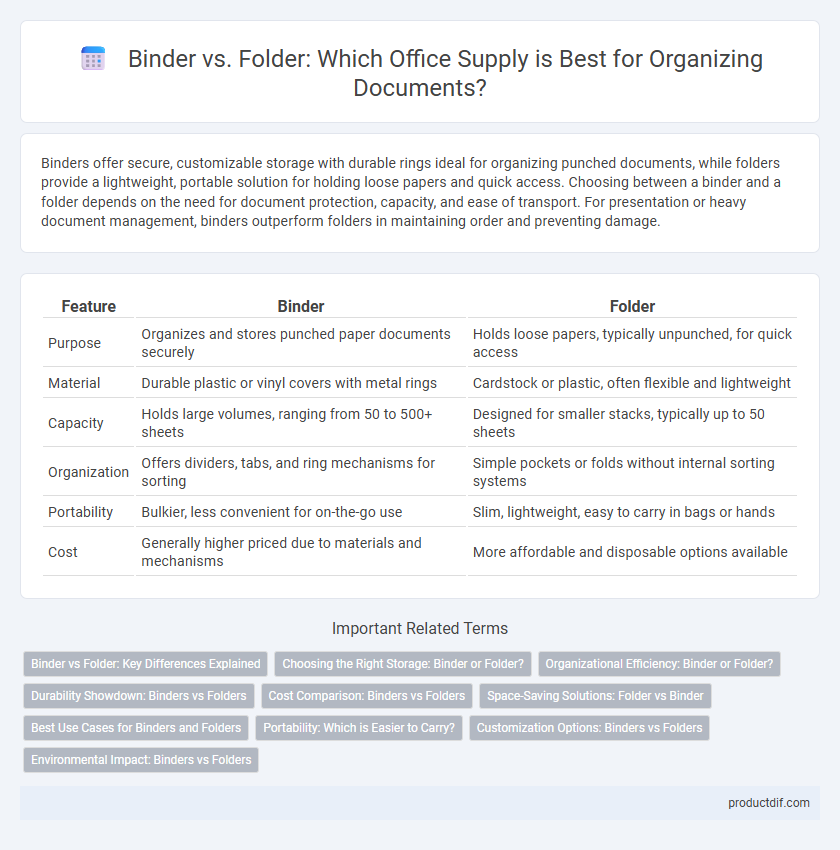Binders offer secure, customizable storage with durable rings ideal for organizing punched documents, while folders provide a lightweight, portable solution for holding loose papers and quick access. Choosing between a binder and a folder depends on the need for document protection, capacity, and ease of transport. For presentation or heavy document management, binders outperform folders in maintaining order and preventing damage.
Table of Comparison
| Feature | Binder | Folder |
|---|---|---|
| Purpose | Organizes and stores punched paper documents securely | Holds loose papers, typically unpunched, for quick access |
| Material | Durable plastic or vinyl covers with metal rings | Cardstock or plastic, often flexible and lightweight |
| Capacity | Holds large volumes, ranging from 50 to 500+ sheets | Designed for smaller stacks, typically up to 50 sheets |
| Organization | Offers dividers, tabs, and ring mechanisms for sorting | Simple pockets or folds without internal sorting systems |
| Portability | Bulkier, less convenient for on-the-go use | Slim, lightweight, easy to carry in bags or hands |
| Cost | Generally higher priced due to materials and mechanisms | More affordable and disposable options available |
Binder vs Folder: Key Differences Explained
Binders provide durable storage with ring mechanisms for securing punched documents, making them ideal for frequent access and organization of large volumes of paper. Folders offer lightweight, flexible options primarily used for temporary storage or sorting of loose sheets without the need for hole punching. The choice between binders and folders depends on document handling needs, with binders suited for long-term, structured organization and folders best for quick, portable filing.
Choosing the Right Storage: Binder or Folder?
Binders offer customizable storage with ring mechanisms ideal for organizing punched documents, making them suitable for frequently accessed materials and easy updates. Folders provide a lightweight, flexible solution for grouping loose papers without holes, perfect for temporary storage or transporting documents. Selecting between binders and folders depends on the need for durability, document protection, and accessibility in office organization.
Organizational Efficiency: Binder or Folder?
Binders offer superior organizational efficiency for bulky documents by providing customizable dividers and secure ring mechanisms, enabling easy access and categorization. Folders, while lighter and more portable, are ideal for managing fewer, less complex papers without the need for extensive sorting. Choosing between a binder and a folder depends on the volume of materials and the necessity for structured organization in office workflows.
Durability Showdown: Binders vs Folders
Binders typically offer superior durability compared to folders due to their rigid covers and metal rings that securely hold documents, preventing wear and tear. Folders, made from thin cardstock or plastic, are more prone to bending, tearing, and damage from frequent handling or heavy use. For long-term storage and repeated access, binders provide a sturdier, more protective option that preserves important papers better than folders.
Cost Comparison: Binders vs Folders
Binders typically incur higher upfront costs ranging from $3 to $10 each, depending on size and material quality, while folders generally cost between $0.10 and $1 per unit, making them more budget-friendly for bulk purchases. The expense of binders increases over time due to the need for additional accessories like sheet protectors and dividers, whereas folders require minimal supplementary items, reducing ongoing costs. For long-term organizational needs, folders offer a cost-effective solution, whereas binders provide durability and reusability that may justify their higher price point in specific office settings.
Space-Saving Solutions: Folder vs Binder
Folders offer a compact, lightweight space-saving solution ideal for organizing documents in limited storage areas, as they easily fit into drawers and stacked shelves. Binders, while bulkier due to their rings and spine, provide robust protection and customizable organization with dividers and pockets but require more shelf space. Choosing between folders and binders depends on prioritizing minimal storage footprint versus enhanced document security and accessibility.
Best Use Cases for Binders and Folders
Binders are ideal for organizing large volumes of documents that require frequent updating, such as project reports, meeting notes, and presentations, due to their durability and ability to hold punched paper securely. Folders are best suited for managing smaller sets of documents, like handouts, invoices, or forms, providing quick access and portability without the bulk of a binder. Selecting between binders and folders depends on the document size, usage frequency, and the need for easy insertion or removal of sheets.
Portability: Which is Easier to Carry?
Folders are generally more portable than binders due to their lightweight and slim design, making them easier to carry in bags or by hand. Binders, while offering more space and organization with rings and pockets, tend to be bulkier and heavier, which can be cumbersome for daily transport. For professionals and students prioritizing ease of portability, folders provide a compact solution without sacrificing essential document protection.
Customization Options: Binders vs Folders
Binders offer extensive customization options such as interchangeable spine labels, cover inserts, and ring mechanisms that accommodate various paper sizes and organizational needs. Folders provide limited customization, mostly in color, material, and tab positioning, suited for straightforward document sorting and quick access. Choosing between binders and folders depends on the level of personalization required for storage, presentation, and ease of document updates.
Environmental Impact: Binders vs Folders
Binders typically have a higher environmental impact due to their use of plastic, metal rings, and heavier materials that are less biodegradable and harder to recycle compared to folders, which are often made from recyclable or compostable paper and cardboard. The production of binders consumes more energy and resources, leading to greater carbon emissions, while paper folders contribute less to landfill waste when disposed of properly. Choosing folders over binders reduces long-term ecological footprint by minimizing plastic pollution and enhancing recyclability in office supply usage.
Binder vs Folder Infographic

 productdif.com
productdif.com